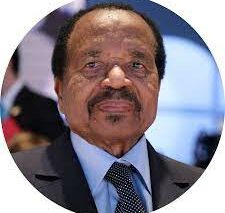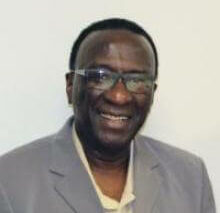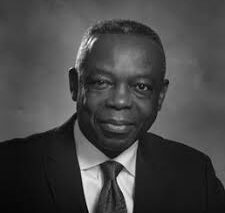(Interview conducted on December 26, 2015 by Mrs. Lola Perpetua Nkamanyang (Ph.D), Lecturer, Cultural Attachée, Cameroon Embassy, Abuja, Nigeria)
Let me start our interview by asking you to tell us, in your own words, who you are. Who is Shutav Martin Jumbam?
Who am I? Well, I’m a Shutav. I know some Nso people who loudly contest the validity of my title, claiming it doesn’t exist in Nso martial history. I can only say: “Lord, forgive them for they know not what they are saying.” (laughs loud). On a more serious note, I am a translator and a conference interpreter by training and a freelance journalist. I retired from active duty several years ago but, as the popular saying goes, “retired but not tired”. I thank God for giving me good health to continue to do what I am trained to do, that is, ease communication through translation, conference interpretation and journalism. I work for the Catholic media in the Archdiocese of Douala. I write for L’Effort camerounais and run a program on Radio Veritas, the radio of the Archdiocese of Douala. I am a father of three, a girl and two boys. My children are grown up and are now living on their own. Hermine and I are now living as we started off well over thirty years ago, just the two of us.
You must miss them, I imagine.
For sure, we miss them, especially as they are not even in the country. My daughter lives in Toronto, Canada, and my two boys live in California. But, you don’t bring them into the world for them to sit around you, do you? They too must move on with their own lives. All you do is pray that they live happy lives and succeed in whatever enterprise they may undertake.
When the Bongkisheri Women’s group together with the women from Bafia and Bamoun took a giant step to bring together the Nso, Bamoun and Bafia people living in Douala under the canopy of MANDJARA, you were very instrumental in the success of the event, notably your assistance in the production of their maiden magazine. Many men would shun such a huge responsibility on grounds that women were at the forefront. What is Shutav Martin Jumbam’s relationship with Bongkisheri Women’s Group, Douala?
Hermine, my wife, is an active member of the Douala Bongkisheri group and she asked me to help with the magazine. So, to maintain matrimonial harmony and be sure of three square meals on my table each day, I couldn’t say no (laughs). That said, let me say that I was very impressed by the initiative of our women to unite our people: Nso, Bamum and Bafia. At first I was quite skeptical about it but the commitment you women showed convinced me that something good would come out of it, and I wasn’t wrong. I saw how many meetings you held, sometimes late into the night, and how determined you were to achieve success. You dispatched teams throughout the city and they went knocking on doors I would fear to approach, talking with administrative and religious officials of the city, and receiving commitments from them. I admired those bold steps that yielded good fruit. City officials gave their head nods to the endeavour and Christian Cardinal Tumi attended the intellectual evening discussions that launched the event. You were able to bring Nso, Bamum and Bafia intellectuals from far and wide to discuss our joint history. That was great and I was happy to help in the production of the magazine that graced that event. I recall that Christian Cardinal Tumi was so impressed he urged you women to continue to lead the men and initiate more of such events. I hope you did listen to him.
That was indeed a great event. Thank you for your role in making it as successful as it was. Now, let me ask you about an initiative you undertook that has yielded much fruit among Nso people the world over: the Shuundzev chat group. What motivated you to create it?
Shuundzev started as a physical group that met in Douala once a month. It was a Nso group, like any other, the main aim being to bring members together to socialize and be of mutual assistance where and whenever necessary. However, it was not always called “Shuundzev”; that name came later as a result of a brainstorming exercise several months after the group was already functioning. The issue of a name came up and, as it is usually the case, many suggestions came up. None sounded good enough until someone, more inspired than the rest of us, suggested “Shuundzev”. It sounded funny to our ears at first, but then, after mature reflection, members adopted it as the name of the group. As it is the case with all such groups of a tribal nature, members discussed issues affecting the welfare and the wellbeing of the Nso man and woman in Douala; how to help families in need and how to improve the social status of the Nso person. Since such groups survive mainly around money – and scatter because of money – we decided to create a ‘njangi’. Then the question of how to rapidly communicate with members came up and it was decided that a chatgroup be created to ease communication. I had already created a chatgroup for the Nkardeca group in Douala that served as a link between sons and daughters of Nkar around the world. I was then assigned the task of creating a similar chatgroup for Shuundzev, which I did. Unfortunately, the physical Shuundzev in Douala died out but the virtual Shuundzev, that is, Shuundzev in cyberspace, has continued to thrive. It serves as vital link between those of us at home and our brothers and sisters abroad. It has become an incredible tool of social communication that brings together our sons and daughters from around the globe.
It has become quite a reference. Who qualifies as a member?
Membership is open, first and foremost, to every full-blooded Nso son and daughter; then to those we have inherited through marriage, or through some professions (non-Nso priests, pastors, imams, who live and work in Nsoland), among others.
Many people are of the opinion that you are the source, the strength and the pillar on which Shuundzev hangs its historical trails and achievements. How do you react to that?
As I mentioned earlier, I came to the fore simply because I had created a similar chatgroup about a year earlier that linked sons and daughters of Nkar around the world. But Shuundzev is very much a joint venture, if you wish. It’s not a single man’s idea.
It plays a very useful role in Nso development efforts, doesn’t it?
The advantage of such groups cannot be overemphasized. We have undertaken great projects together through easy communication. Shuundzev can be proud of its role in promoting admirable projects in Nso land. There is the Shuundzev Scholarship Fund that has been helping children from poor homes to attend primary school in Nso. When a school collapsed in Nkar, an appeal went out to Shuundzev and the response was impressive. There is a business project, the Wirfon Investment Holding, that is the brain child of some business-minded members of Shuundzev. Even the mere fact that members communicate family information through Shuundzev is still great. When a family is bereaved, for example, condolence messages flood the group. Useful information concerning, for example, jobs frequently surfaces and members no doubt benefit from it. It’s an incredible tool for social communication and I’m happy to see Nso sons and daughters using it so well.
As the group coordinator, you are dealing with people from different backgrounds, different ideologies and schools of thought, different age groups and of course different tastes and temperaments. How do you handle the challenges that inevitably arise from such a task?
I don’t run Shuundzev alone. It is governed by rules and regulations that were drafted by great minds among our people. It was a combined effort of our people at home and those abroad. We drafted the articles that would govern it, discussed them extensively and adopted them on the forum. We abide by these rules and regulations and they have served us well so far. Our aim is to welcome as many Nso sons and daughters as possible from around the globe, and so tolerance is the watch word. Sanctioning a member is the last resort. It has happened once, or twice, I believe, but it is rare and I don’t decide alone.
Whenever I read your contributions and interventions on Shuundzev forum, I find in you a moderator, a tolerant person, a writer and critic. I wonder how a single individual can embody and germinate such admirable character traits.
I wish I had a clear-cut answer for you. We all wear different caps at various times in our lives. The important thing, I believe, is to know that each of the caps we wear has been put on our heads by a Supreme Being, not because we are necessarily better than everyone else around us, but because he is imponderable in his wisdom. I’m guided by the biblical injunction that from those to whom more has been given, more is expected, in church or in civil society. I have been given a lot, and I thank the Almighty for it, and so I feel the obligation to share what I have received with others. He did not give me whatever talent I have to hoard or to hide under the bed. As Sacred Scripture tells us, you should not light a lamp and hide it under a tub; rather put it on the lamp-stand so it gives light to all around you. I must use whatever talent God has given me for the benefit of everyone around me. I’m always asked the question: where do you find the time to do all the things you do? And my answer is always simple: when I wake up in the morning and give thanks to God for enabling me to see another day, I then put in his hand everything I have, including my time, which is actually his, since he gives it to me and can take it away whenever he wills it.
What would subsequent generations of Shuundzev remember you for?
I have no idea but I like a verse by the Chilean poet, Pablo Neruda. “Open wide, my hands are spreading grapes in the wind”. Maybe I should be remembered as a simple Nso man whose hands are opened wide and who helps to spread grapes in the wind. Not sour grapes, mind you, but grapes of joy, happiness and peace.
What advice do you have for young aspiring leaders?
My advice to them is simple: know when to quit. I know that’s perhaps not what you expected to hear but anyone in a leadership position must know that the time is coming when they will be called upon to give an account of their leadership role and to yield to someone else. That’s why those who lead by example, serving rather than expecting and requiring to be served, will be greeted by the loudest applause when they eventually and inevitably bow out of the stage. Their names will remain forever engraved in the minds of many. Leadership must be synonymous with service to others or it is no leadership at all.
The Cameroon government has been talking about “emergence by 2035”; where is the place of Shuundzev in the drive towards meeting this target?
I don’t know what “emergence by 2035” means. It’s a political slogan which I don’t relate to, perhaps because at my age I don’t envisage being around in 2035. Whatever the case, Shuundzev may not even be around in 2035 either. Our kids are much more technologically alert than we are and they will surely come up with much brighter ideas for social communication, which is what Shuundzev is all about. Their invention may relegate Shuundzev to the back-burner but Shuundzev will remain in our history books as a forerunner in the field of social communication among the Nso people. So, whether the “2035 emergence” revives and stimulates Shuundzev all the more, or drowns it in the tides of history, it would have lived its day and served the purpose for which it was created, and well too, I believe.
Shutav, many thanks.
My pleasure, Ma’am.



